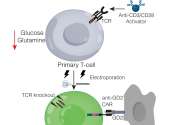New Co-STAR T cells show promise for treating cancers in laboratory study
Using genetic engineering techniques, investigators at the Johns Hopkins Kimmel Cancer Center and its Ludwig Center, the Lustgarten Laboratory and Bloomberg~Kimmel Institute for Cancer Immunotherapy have designed a novel ...
13 hours ago
0
25









